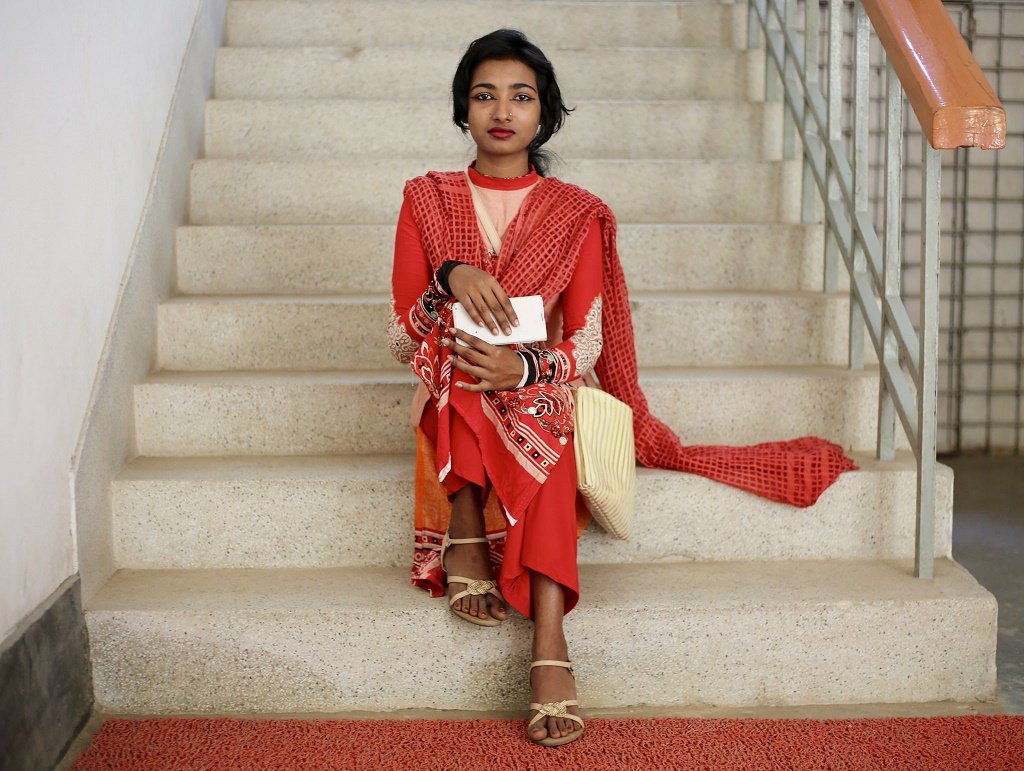It’s a hot and dusty spring afternoon in Dhaka, Bangladesh. Children eat mini mango ice cream cones in a side street filled with passing rickshaws, carts and motorcycles.
Eighteen year old Sharna rolls up the shutters of a small frontage in the bustling neighbourhood. Within minutes, a woman and her daughter appear wanting to place an order for a shalwar kameez in vivid cerise cotton.
Welcome to Sharna’s tailoring shop. Here she sells rolls of fabric and manufactures all kinds of garments and soft furnishings for her local community. Like many 18 year olds, she has an eye for fashion and enjoys bringing new trends into her work.
She is very proud of having her own business and works hard - sometimes into the middle of the night - to meet demand. Her mother helps by serving customers while Sharna works with precision and a determined eye at the single sewing machine stationed in the shop.
 Sharna with her mother at her tailoring shop in Dhaka.
Sharna with her mother at her tailoring shop in Dhaka.
According to the Asian Development Bank, 31.5 per cent of Bangladesh’s population live below the poverty line - around 50 million people. The country’s garment sector forms a major part of the economy, providing jobs to millions of workers.
Sharna is one of 5 brothers and sisters. She lives with her parents in a suburb of Dhaka. She learned to sew at UCEP, the Underprivileged Children’s Educational Programme, a vocational skills training and education project proudly funded by UK aid.
UCEP gives children from very poor backgrounds technical skills training alongside general education followed by employment support. These practical skills increase their employability in Bangladesh’s growing economy. Every year, thousands of UCEP graduates find jobs across Bangladesh thanks to their training.
Sharna’s family were able to combine some limited savings for her to set up the business and put her skills to use.
Sharna projects confidence in her new independence and though these are early days, she has big plans for the future. “Now I have my own business,” she says. “I earn monthly 25000 taka (about £220)”. The average monthly wage in Bangladesh is around £90, so Sharna is well on the way to earning a decent income.

“In the future, I wish to extend my business where more people will work and I will make more profit.”
“To maintain the business properly, satisfy customers and run the daily tasks sometimes create pressure but I am trying to manage everything,” she says.
“I am also now learning the works of beauty parlour and soon I will open a parlour besides my tailoring shop. So, my parents are very positive about my future.”
About UCEP
The UK supports the UCEP programme in Bangladesh alongside other international donors including the Save the Children, Citi Bank NA, Australian High Commission, GIZ, many other local corporations, the private sector and the Government of Bangladesh. DFID has provided a £20 million programme over 4 years.
The programme’s purpose is to provide urban, poor, working children and youth – especially girls and women – with basic education, vocational skills training and the chance to gain employment in market led technical areas.
This story was originally published on Medium.
The views expressed in this article do not necessarily reflect those of Global Citizen.